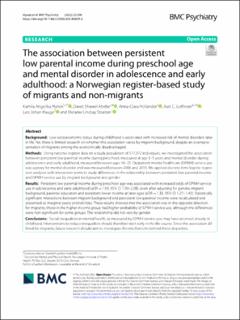The association between persistent low parental income during preschool age and mental disorder in adolescence and early adulthood: a Norwegian register-based study of migrants and non-migrants
Hynek, Kamila Angelika; Abebe, Dawit Shawel; Hollander, Anna-Clara; Liefbroer, Aart C.; Hauge, Lars Johan; Straiton, Melanie Lindsay
Peer reviewed, Journal article
Published version
Permanent lenke
https://hdl.handle.net/11250/2996033Utgivelsesdato
2022Metadata
Vis full innførselSamlinger
- Artikler [5068]
- Publikasjoner fra CRIStin FHI [7544]
Sammendrag
Background: Low socioeconomic status during childhood is associated with increased risk of mental disorders later in life. Yet, there is limited research on whether this association varies by migrant background, despite an overrepresentation of migrants among the economically disadvantaged. Methods: Using national register data on a study population of 577,072 individuals, we investigated the association between persistent low parental income during preschool, measured at age 3–5 years and mental disorder during adolescence and early adulthood, measured between ages 16–25. Outpatient mental healthcare (OPMH) service use was a proxy for mental disorder and was measured between 2006 and 2015. We applied discrete‑time logistic regression analyses with interaction terms to study differences in the relationship between persistent low parental income and OPMH service use by migrant background and gender. Results: Persistent low parental income during preschool age was associated with increased odds of OPMH service use in adolescence and early adulthood (aOR = 1.99, 95% CI 1.90–2.08), even after adjusting for gender, migrant background, parental education and persistent lower income at later ages (aOR = 1.33, 95% CI 1.27–1.40). Statistically significant interactions between migrant background and persistent low parental income were recalculated and presented as marginal yearly probabilities. These results showed that the association was in the opposite direction for migrants; those in the higher income group had higher probability of OPMH service use, although the differences were non‑significant for some groups. The relationship did not vary by gender. Conclusions: Social inequalities in mental health, as measured by OPMH service use, may have an onset already in childhood. Interventions to reduce inequalities should therefore start early in the life course. Since the association differed for migrants, future research should aim to investigate the mechanisms behind these disparities. The association between persistent low parental income during preschool age and mental disorder in adolescence and early adulthood: a Norwegian register-based study of migrants and non-migrants
